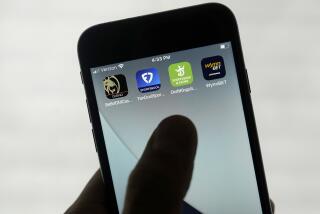Elevating Gambling to New Heights--on Airline Flights
- Share via
Coffee, tea or craps?
An increasing number of airline and gambling business leaders are betting that in-flight gaming will soon be a standard option for long-haul travelers outside the United States.
Federal law currently bans gambling on any U.S. carrier anywhere, or on any flight that begins or ends in the United States. But in the wake of a new, more permissive, Transportation Department interpretation of a 1994 law restricting gaming equipment, British Airways and Singapore Airlines have each announced plans to introduce gambling by credit card on non-U.S. flights, and in this country.
In addition, a new Transportation Department study warns that foreign carriers will be handed a major competitive advantage if they can reap global gambling revenues and U.S. carriers can’t.
At British Airways, officials expect to have one gambling-friendly 747 aloft this month or next, serving London, Hong Kong, Johannesburg and, with the gaming equipment disabled, Miami and Los Angeles. Beyond that, spokesman John Lampl reports plans to begin outfitting 125 of the carrier’s long-haul jets--roughly half of its fleet--late this year.
Since more than 450 of British Airways’ roughly 500 daily departures from London go to non-U.S. destinations, the carrier will be able to offer gambling on the majority of its flights. But Lampl calls the U.S. gambling ban “the big hiccup” in British Airways’ vision of in-flight gaming, adding that “We’re hopeful that at some point in time the law will change.”
The new consoles, which cost the airline an estimated $1 million each, include movies on demand, video games and other entertainment and communications aside from gambling. But most of the revenue is likely to be generated by the machine’s gambling offerings, including poker, blackjack, roulette and electronic slots. Passengers age 18 and older will ante up with a swipe of their credit card, but will be limited in what they can wager. Economy (coach) traveler losses will be capped at about $112, said Lampl; business and first-class passengers will have loss limits of $225-$300.
At Singapore Airlines, officials have announced similar plans, with introduction of electronic slots, blackjack, poker and various entertainment and communication features on long-haul jets scheduled for late this year or early next. Airline officials say the participating credit cards (Mastercard and Visa) have set an across-the-board loss limit of $350 per passenger.
“A lot of people are going to be watching what happens,” says Rob Brookler, spokesman for the World Airline Entertainment Assn., a trade group composed of 85 airlines and about 250 supplier companies, including movie studios and makers of audio and gaming equipment. “Will passengers, if they lose, have some ill will toward the carrier?” he asked. “Will people get overly excited? Or will there be legislative obstacles?”
If the early gambling pays off for British Airways and Singapore Airlines, he added, “there are a lot of people in the wings, if you’ll pardon the pun, who will want to jump in. . . . You’re going to see a lot of pressure from the U.S. carriers on the legislators in this country to let them do it in some way--possibly an exemption akin to cruise gambling.”
Cruise ships serving U.S. ports commonly close down their casinos when they’re in U.S. waters, but open for betting once they reach international territory. U.S. officials acknowledge that they have received diplomatic protests over this country’s efforts to prescribe foreign airlines’ conduct outside the territorial limits of the United States.
At British Airways’ competitor, Virgin Atlantic Airways, spokesman Richard D’Ambrosio notes that Virgin flights for more than three years have featured seat-back in-flight games, but with no money at stake. “We have examined the possibility of opening it up to real wagering, but for a variety of reasons, we have decided not to,” D’Ambrosio says. “If British Airways and Singapore were to enact their systems and we were to see a market-share shift, we might reconsider.”
The Transportation Department study, released April 12, estimates that if in-flight gambling is offered, 18% of international passengers would use it, generating new revenues of $480 million yearly for foreign carriers on non-U.S. flights. If U.S. laws were changed to allow gambling on foreign-carrier flights to or from the United States, the study continues, those carriers could gain another $112 million a year.
Alternatively, if the law were changed to allow U.S. carriers to offer gambling on their international flights, the study estimates that the U.S. carriers would gross an extra $300 million yearly, boosting their annual profits by an estimated $225 million.
Which raises an intriguing question: Would carriers pocket those revenues, or would competition drive them to accept narrower gaming profit margins, or might gambling serve to underwrite international fare cuts, and make foreign flights a little bit cheaper for all?
“There’s no precedent,” says Ed Perkins, editor of the Consumer Reports Travel Letter. But he’s skeptical about the chances of non-gambling passengers gaining anything from the advent of in-flight betting. And like the compilers of the Transportation Department study, he wonders exactly who will regulate all these new in-flight gambling operations, and how.
Reynolds travels anonymously at the newspaper’s expense, accepting no special discounts or subsidized trips. To reach him, write Travel Insider, Los Angeles Times, Times Mirror Square, Los Angeles 90053; telephone (213) 237-7845.
More to Read
Inside the business of entertainment
The Wide Shot brings you news, analysis and insights on everything from streaming wars to production — and what it all means for the future.
You may occasionally receive promotional content from the Los Angeles Times.











